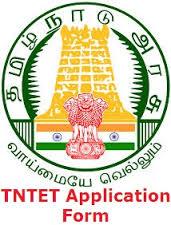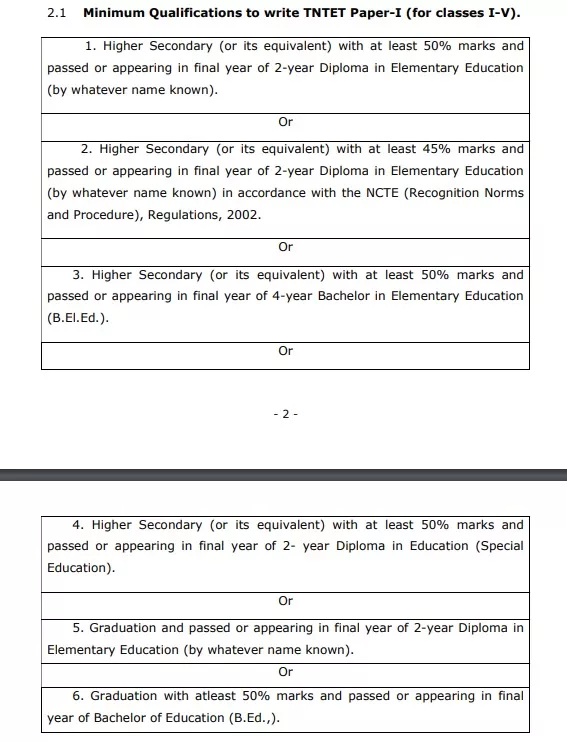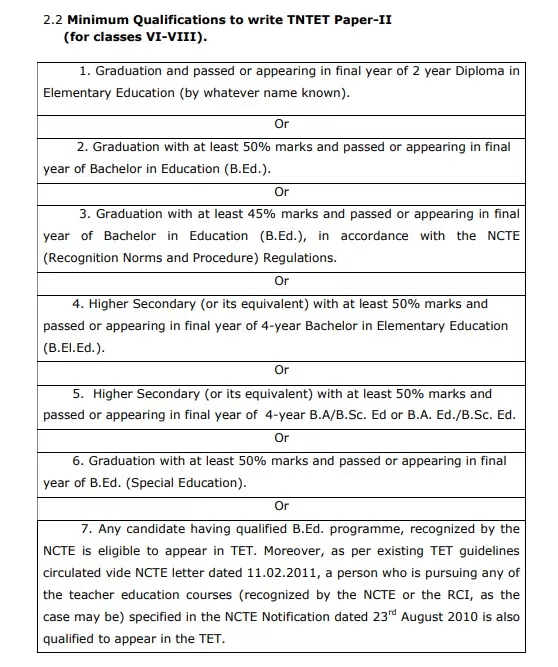Tamil Nadu TET Exam 2024 Application Form Exam Last Date. The Teachers Recruitment Board (TRB) of Tamil Nadu has published the notification of TN TET 2024 for the post of Teacher on 07 March 2024. All students should submit their TNTET application form 2024 online from March 14 to April 13, 2024 through the official website trb. tn.nic.in or direct links below. Before filling up the TNTET Application Form 2024, candidates need to have all the necessary documents ready such as scanned copy of their passport size photograph, scanned copy of signature, bank details etc. Candidates who want more details about TNTET notification such as eligibility, application fee, age limit, how to apply should read the entire article till the end.
Registration involves filling out the TNTET Application Form 2024, after which candidates can proceed to fill in the details. When filling out the TNTET 2024 application form, candidates will need to upload their passport size photo and scanned photo of the signature in the size and format recommended by the TNTET exam authorities. Required application fee Rs. TNTET Application Form 500 (per paper) must be paid at the time of filling up the application form.
TNTET Application Form 2024 Important dates
- Notification Release Date: 7th March 2024
- Application Form Date: 14th March 2024
- Last date to Apply Online: 13th April 2024
- TNTET Hall Ticket Release Date: May 2024
- Paper 1 Exam Date: June 2024
- Paper 2 Exam Date: June 2024
- Result of TNTET Date: July 2024
TNTET Exam 2024 Notification
The Teacher Recruitment Board (TRB) of Tamil Nadu has released the schedule of TNTET 2024 notification examination. Interested candidates can view the TNTET 2024 exam date from the official website @ trb.tn.nic.in. The tet exam 2024 application form last date is April 13 2024. According to the test, Schedule Board is going to upload TNTET 2024 notification on its website on March 7, 2024. The date of TNTET 2024 Paper I and II will be announced later. The exam will consist of 150 multiple choice questions (MCQs) for a period of 3 hours. TNTET will be conducted to assess the qualifications of teachers in schools in Tamil Nadu.
About TNTET
The Teacher Eligibility Test is a nationally and state level examination conducted to determine candidates’ eligibility for appointment as teachers in central schools or state schools. Every year, millions of candidates from different parts of the country come for TET who intend to be recruited for any of the following teaching posts:
- Primary Teachers (PRTs): For Class 1-5
- Trained Graduate Teachers (TGTs): For grades 6-10
- Postgraduate teachers (PGTs): for classes 11-12
TNTET Application Form 2024
Recently, the Government of Tamil Nadu Teacher Recruitment Board has issued notification of Tamil Nadu Teacher Eligibility Test 2024 on the official website – trb.tn.nic.in. Candidates are invited to apply for Teacher Eligibility Test Paper-I and Paper-II for 2024 through online mode. Candidates who want to become teachers should submit TNTET 2024 application form. Application forms are available on the website of the Tamil Nadu Teachers Recruitment Board, the authority for conducting examinations. According to the official notification of TNTRB, applications will be accepted in online mode only, and applicants will have to fill up separate applications for Paper-I and Paper-II. The date of TNTET 2024 Paper I and II will be announced later. TNTET will be conducted to assess the qualifications of teachers in schools in Tamil Nadu. Therefore, above are the details of the application. Candidates will have to go to the official website to apply for the notification.
Tamil Nadu Teacher Eligibility Test Notification 2024 Details
| Organization Name | Tamil Nadu Teachers Recruitment Board |
| Name of Posts | Teachers Posts |
| Job Location | Tamil Nadu |
| Exam Name | Tamil Nadu Teacher Eligibility Test (TNTET) |
| Level of Exam | State-level Exam |
| TN TET Application Form Start Date | 14 March 2024 |
| Last Date of TN TET Application Form | 13 April 2024 |
| Application Mode | Online |
| Official website | www.trb.tn.nic.in |
TNTET application form 2024 Eligibilty criteria
Education Qualification
- Education Qualification for Paper 1
Candidates must have graduated with D.ED (Diploma in Elementary Education) according to the Tamil Nadu Educational Recruitment Board for Class I to 5th Paper.
- Education Qualification for Paper 2
The Educational qualification for 6th to 8th class paper is minimum graduation according to Tamil Nadu Board of Education Recruitment. 50% Number + B.ED ie Candidate must be at least Graduate. 50% marks with B.ED (Bachelor’s degree in elementary education)
Age Limit
Age Limit: Candidates must be above 18 years of age to apply for the Tamil Nadu Teaching Eligibility Test 2024 and there is no age limit for candidates to apply for this test.
- Applicant’s age should not less than 18 years
- But not more than 40 Years.
- Relaxation in upper age limit to the reserved category candidates as per Govt. rules and regulations.
Application Fee
An application fee of Rs.500 / – will be charged by the Tamil Nadu Board of Educational Recruitment for applying for the Tamil Nadu Teaching Aptitude Test 2024. The examination fee for all specific candidates is Rs.500 / – and for SC, SCA, ST and persons with disabilities is Rs 250 .
- Fees of all candidates – Rs. 500 / – SC, SCA, ST, and Persona with Disability
- Candidates with SC, SCA, ST and Disability – Rs. 250 / –
- The application fee will not be refunded under any circumstances.
- Fees can only be paid in online mode.
- If candidates want to apply for both the leaflets, they all have to pay double application fee.
Documents Required for TET Exam
Candidates who want any more details about TNTET required document the important documents are mention below
- Recent photograph
- ID proof
- Age Certificate
- Qualifications Certificate
- Academic Records
- Experience Certificate
- Caste Certificate (For non-general category)
TNTET Exam Date 2024 Tamil nadu
Tamil Nadu Teachers Recruitment Board has issued notification of TNTET (Tamil Nadu Teacher Eligibility Test) 2024 on March 07, 2024. Candidates have called for application form through online mode for Paper-I and Paper-II of Teacher Eligibility Test for the year 2024. Official News: The TNTET 2024 Notification Application Form was launched on March 14, 2024, and the last date to apply online is April 13, 2024. Candidates who want to become teachers must apply for Paper I (from Class 1) of TNTET 2024. 5) and Paper 2 (Class 6 to 8). Interested candidates should fill up the TNTET Notification 2024 application form online before the April 13, 2024 deadline.
TET exam date 2024 examination for Paper I: April 2024
TET exam date 2024examination for aper II: April 2024
TET Exam 2024 Syllabus
Candidates who want to work as teachers in various public and private schools. To pass the Teacher Eligibility Test, candidates must need the TET Exam 2024 in Tamilnadu Syllabus. The State TET Curriculum 2024 pdf will be included in this article and the appropriate marking scheme examination pattern, depending on the complex subject matter, key topics and qualifying numbers, etc. All the questions asked in TET Exam 2024 will be multiple-choice questions (MCQs), each with one number, with four options. There is no negative sign. The testing body will strictly adhere to the structure and content of the TET Curriculum 2024 outlined below.
TET Syllabus 2024 Paper-1
Child Development and Pedagogy
- Child Development:
- Concept of growth and development,
- Principles and dimensions of development
- Factors affection development (especially in the context of family and school) and its relationship with learning.
- Role of Heredity and environment.
- Meaning and Concept of learning and its processes.
- Factors of Affection learning.
- Theories of learning and its implication.
- How Children learn and think.
- Motivation and Implications for Learning.
- Individual Differences
- Types and factors Affection,
- Individual differences basis of language, gender, community, caste & religion.
- Personality
- Concept and types of personality,
- Factors responsible for shaping to personality
- Intelligence Concept, Theories, and its measurement,
- Multidimensional Intelligence.
- Understanding diverse learners:
- Mentally retarded,
- gifted, creative,
- disadvantaged and deprived, s
- specially-abled. Learning Difficulties.
- Concept and ways of adjustment.
- Role of teacher in the adjustment.
- Teaching-learning process,
- Teaching-learning strategies and methods
- Meaning and purposes of Assessment,
- Measurement, and Evaluation.
- Comprehensive and Continuous Evaluation.
- Constriction of Achievement Test.
- Action Research.
- Right to Education Act 2009 (Role and Responsibilities of Teachers).
- etc.
II. Language I Syllabus:
- a) Language Comprehension:
- Reading unseen passages,
- Two passages one prose or drama and one poem with questions on comprehension,
- Inference,
- Grammar
- Verbal ability (Prose passage may be literary, scientific, narrative or discursive).
- b) Pedagogy of Language Development: 15 Questions
- Learning and acquisition
- Principles of language Teaching
- Role of listening and speaking;
- Function of language
- How children use it as a tool
- A critical perspective on the role of grammar.
- Challenges of teaching language in a diverse classroom;
- Language difficulties,
- Errors and disorders Language Skills
- Evaluating language comprehension
- Speaking and listening proficiency,
- Reading and writing proficiency.
- etc.
III. Language II Syllabus:
- a) Comprehension:
- Two unseen prose passages
- Grammar and verbal ability
- b) Pedagogy of Language Development:
- Learning and acquisition
- Principles of language Teaching
- Role of listening and speaking;
- The function of language and how children use it as a tool
- A critical perspective on the role of grammar.
- Challenges of teaching language in a diverse classroom;
- Language difficulties, errors and disorders
- Language Skills
- Evaluating language comprehension and proficiency:
- Speaking, listening,
- Reading and writing
- Teaching-learning materials.
- Etc.
IV. Mathematics Syllabus:
- a) Content:
- Geometry
- Shapes & Spatial Understanding
- Solids around Us
- Numbers
- Addition and Subtraction
- Multiplication
- Division
- Measurement
- Weight
- Time
- Volume
- Data Handling
- Patterns
- Money
- b) Pedagogical issues:
- Nature of Mathematics/Logical thinking;
- Understanding children’s thinking and reasoning patterns.
- Place of Mathematics in Curriculum
- Language of Mathematics
- Community Mathematics
- Valuation through formal and informal methods
- Problems of Teaching
- Error analysis and related aspects of learning and teaching.
- Diagnostic and Remedial Teaching
V. Environmental Studies Syllabus:
-
- a) Content: I. Family and Friends:
- Relationships
- Work and Play
- Animals
- Plants
- II. Food
- III. Shelter
- IV. Water
- V. Travel
- VI. Things We Make and Do
- b) Pedagogical Issues:
- Concept and scope of EVS
- Significance of EVS integrated EVS
- Environmental Studies & Environmental Education
- Learning Principles
- Scope & relation to Science & Social Science
- Approaches to presenting concepts
- Activities
- Experimentation/Practical Work
- Discussion
- CCE
- Teaching material/Aids
- Problems
TET Syllabus 2024 Paper-2
Child Development and Pedagogy:
- Concept of development and its relationship with learning
- Principles of the development of children
- Influence of Heredity & Environment
- Social world & children (Teacher, Parents, Peers)
- Concepts of child-centred and progressive education
- Critical perspective of the construct of Intelligence
- Multi-Dimensional Intelligence
- Language & Thought
- Gender as a social construct;
- The distinction between Assessment for learning and assessment of learning;
- School-Based Assessment,
- Continuous & Comprehensive Evaluation
- b) Concept of Inclusive education and understanding children
- Addressing learners from diverse backgrounds
- Addressing the needs of children
- Addressing the Talented, Creative, Specially abled Learners
- c) Learning and Pedagogy:
- How children think and learn;
- How and why children ‘fail’ to achieve success in school performance.
- Basic processes of teaching and learning;
- Children’s strategies of learning;
- Learning as a social activity;
- The social context of learning.
- Child as a problem solver and a ‘scientific investigator’
- Alternative conceptions of learning in children,
- Understanding children’s ‘errors’ as significant steps in the learning process.
- Cognition & Emotions
- Motivation and learning
- Factors contributing to learning
Language – I
- a) Language Comprehension:
- Reading unseen passages – inference, grammar and verbal ability.etc.
- b) Pedagogy of Language Development:
- Learning and acquisition
- Principles of language Teaching
- Role of listening and speaking;
- Critical perspective on the role of grammar
- Challenges of teaching language in a diverse classroom;
- Llanguage difficulties and errors and disorders
- Language Skills
- Evaluating language comprehension and proficiency:
- Teaching- learning materials:
- Remedial Teaching
Language – II
- a) Comprehension:
- Two unseen prose passages
- b) Pedagogy of Language Development:
- Learning and acquisition
- Principles of language Teaching
- Role of listening and speaking;
- Function of language and how children use it as a tool
- Critical perspective on the role of grammar.
- Challenges of teaching language in a diverse classroom;
- Language difficulties,
- Errors and disorders
- Language Skills
- Evaluating language comprehension and proficiency:
- Teaching – learning materials:
- Remedial Teaching
- etc.
Mathematics and Science:
- Number System: Knowing our Numbers and Playing with Numbers
- Whole Numbers
- Negative Numbers and Integers
- Fractions
- Algebra: Introduction to Algebra
- Ratio and Proportion
- Geometry: Basic geometrical ideas (2-D)
- Understanding Elementary Shapes (2-D and 3-D)
- Symmetry: (reflection)
- Construction (using Straight edge Scale, protractor, compasses)
- Mensuration
- Data handling
- b) Pedagogical issues:
- Nature of Mathematics/Logical thinking
- Place of Mathematics in Curriculum
- Language of Mathematics
- Community Mathematics
- Evaluation
- Remedial Teaching
- Problem of Teaching
- (ii) Science:
- I. Food: Sources of food, Components of food, Cleaning food
- II. Materials: Materials of daily use
- III. The World of the Living
- IV. Moving Things People and Ideas
- V. How things work: Electric current and circuits, Magnets
- VI. Natural Phenomena
- VII. Natural Resources
- b) Pedagogical issues:
- Nature & Structure of Sciences
- Natural Science/Aims & objectives
- Understanding & Appreciating Science
- Approaches/Integrated Approach
- Observation/Experiment/Discovery (Method of Science)
- Innovation
- Text Material/Aids
- Evaluation – cognitive/psychomotor/affective
- Problems
- Remedial Teaching
Social Studies/Social Sciences:
- I. History: When, Where and How
- The Earliest Societies
- Early States
- New Ideas
- The First Empire
- Contacts with Distant lands
- Political Developments
- Culture and Science
- Kings and Kingdoms
- Sultans of Delhi
- Architecture
- Creation of an Empire
- Social Change
- Regional Cultures
- The Establishment of Company Power
- Rural Life and Society
- Colonialism and Tribal Societies
- The Revolt of 1857-58
- Women and reform
- Challenging the Caste System
- The Nationalist Movement
- India After Independence
- II. Geography
- Geography as a social study and as a science
- Planet: Earth in the solar system
- Globe
- Environment in its totality: natural and human environment
- Human Environment: settlement, transport and communication
- Resources: Types-Natural and Human
- Agriculture
- III. Social and Political Life
- Diversity
- Government
- Local Government
- Making a Living
- Democracy
- State Government
- Understanding Media
- Unpacking Gender
- The Indian Constitution
- Parliamentary Government
- The Judiciary
- Social Justice and the Marginalised
- b) Pedagogical issues:
- Concept & Nature of Social Science/Social Studies
- Class Room Processes, activities and discourse
- Developing Critical thinking
- Enquiry/Empirical Evidence
- Problems of teaching Social Science/Social Studies
- Sources – Primary & Secondary
- Projects Work
- Evaluation
TNTET 2024 Exam Pattern
- Exam Duration – 150 minutes
- Total questions – 150
- Question Type – Multiple Choice
- Pass Percentage – 60
Qualifying Marks
| Category | Qualifying %age | TET Passing Marks | TET Total Marks |
| General | 60% | 90 | 150 |
| SC/ST/OBC | 55% | 82 | 150 |
How to apply for TNTET 2024
- First, visit the official website trb.tn.nic.in.
- The web page of Tamil Nadu Education Recruitment Board will open.
- Now click on Tamil Nadu Teacher Eligibility Test (TNTET) 2024 notification.
- Click on the link to apply for Tamil Nadu Teacher Eligibility Test 2024.
- Register yourself by filling out the required credentials.
- Login ID after registration.
- Fill out the application form and upload the required document.
- Confirm all details provided and submit details.
- Pay the application form fee through online mode.
- Click the Submit button.
- Print for final submission of application for future reference.
website: trb.tn.nic.in.



